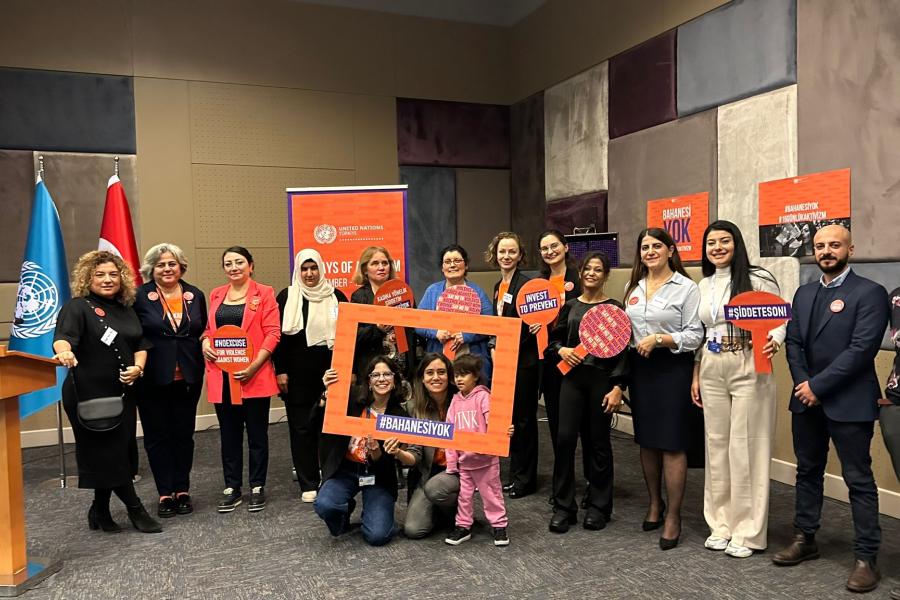UN Türkiye focuses on "Untold Stories of Women with Disabilities in the Earthquake Zone"
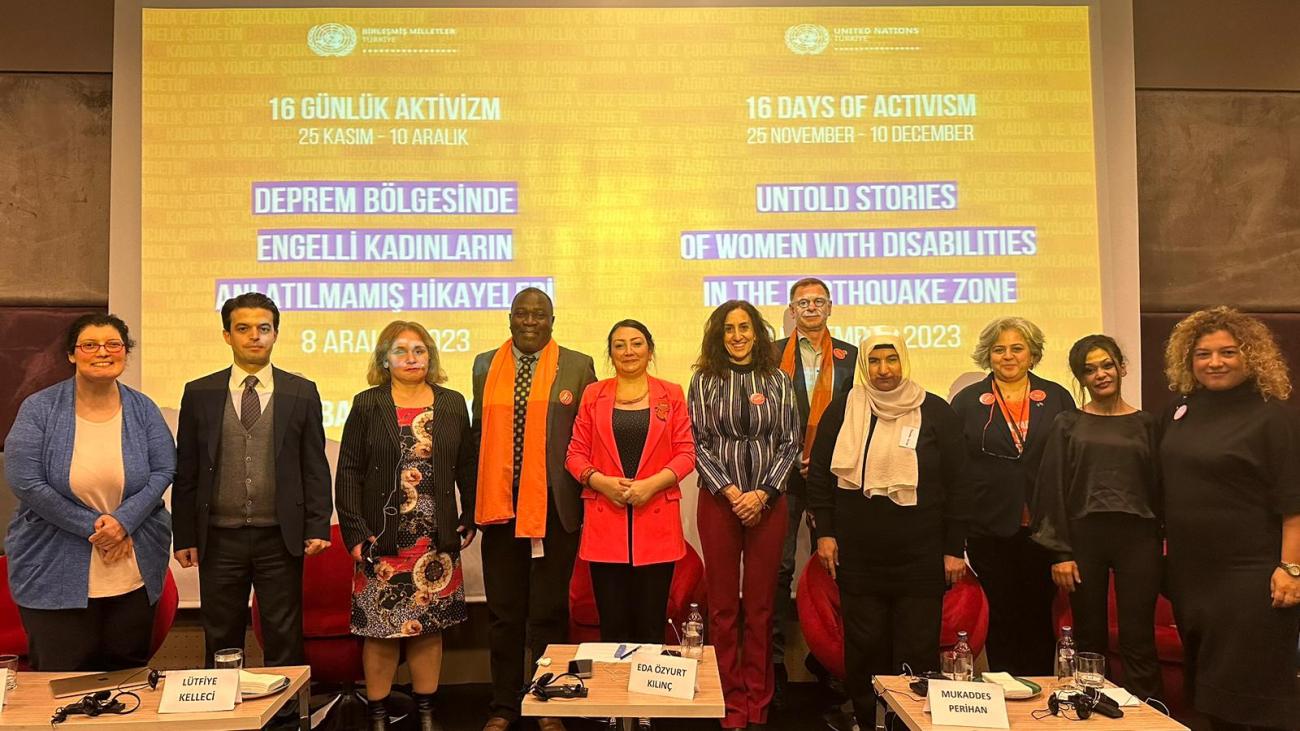
A meaningful Panel discussion on women with disabilities convened as part of the 16 Days of Activism against gender-based violence in Gaziantep
“We say loud and clear - No Excuse to any form of gender-based violence, committed against any woman or girls, including those with disabilities” UN Resident Coordinator said.
When natural disasters strike communities, women and girls are hit the hardest and among them those living with disabilities are the most vulnerable. The challenges they face are often overlooked.
UN Türkiye brought together women and girls with disabilities, government officials, NGOs, academia, and its partners to shed light on the challenges women and girls face during and aftermath of natural disasters.
"Untold Stories of Women with Disabilities in the Earthquake Zone" took place in Gaziantep on December 8th, one of the 11 provinces affected by the twin earthquakes that took place on February 6 in southern Türkiye.
United Nations (UN) agencies in Türkiye, including IOM, UNICEF, UNIC, UNFPA, and UN Women with support from the Area Based Coordination team organized the event as part of the 16 Days of Activism campaign against gender-based violence.
The event focused on the unique challenges and risks experienced by women and girls with disabilities, as well as women supporting family members with disabilities, in the wake of recent earthquakes. A central focus was on their heightened vulnerability to violence against women (VAW) and the role of service providers in mitigating such risks.
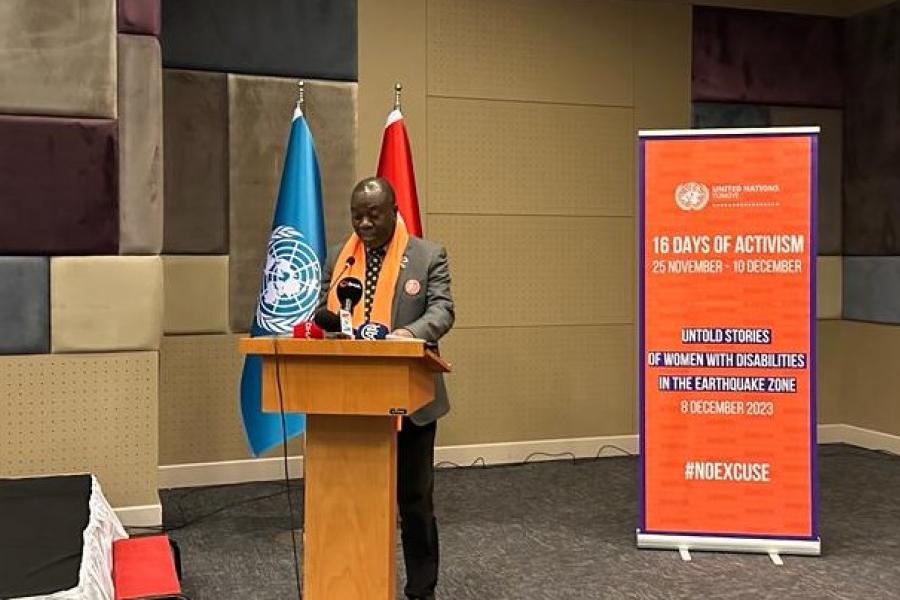
Opening the event, the UN Resident Coordinator Babatunde Ahonsi emphasized the importance of integrating the voices and perspectives of women and girls with disabilities into decision-making processes. He highlighted the heightened exposure to physical violence due to limited mobility, accessibility challenges, and the trauma of disasters, coupled with societal stigma.
Limited access to resources and job opportunities post-earthquake further exacerbated the vulnerability of women and girls with disabilities to exploitation and economic abuse.
“Addressing these challenges requires a comprehensive understanding of the realities faced by women and girls with disabilities, and actions by all of us to support them to be able to fully exercise their rights,” said Ahonsi and emphasized that the UN country team will continue working closely with partners and stakeholders to enhance the roles of women and girls with disabilities across all aspects of development.
“We say loud and clear - No Excuse to any form of gender-based violence, committed against any woman or girls, including those with disabilities” Ahonsi said.
Also speaking at the event Claudia Natali, IOM Deputy Chief of Mission emphasized the need to work together to provide a safe and accessible environment where women and girls with disabilities can have their voices heard and their rights protected.
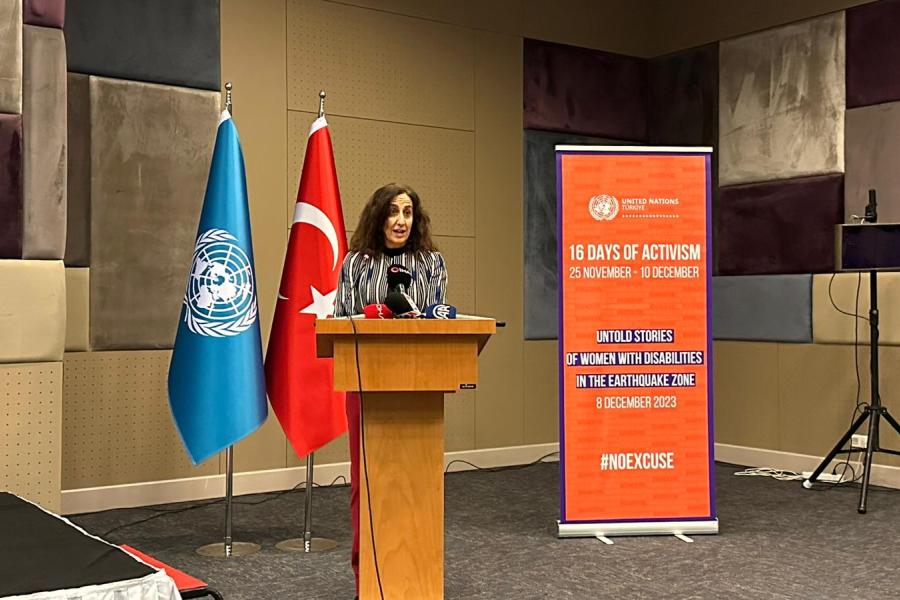
“Let us take concrete action toward a safer and more inclusive society that guarantees women and girls, with and without disabilities, in vulnerable situations, equal access to their rights throughout the recovery process,” said Natali.
Deputy Governor of Gaziantep Murat Akyüz, presenting on the current situation of people with disabilities in Türkiye, revealed that 56 per cent of the 4.876 million individuals facing disabilities were women. Akyüz underlined the need to address the employment and social inclusion of women with disabilities, citing Gaziantep's efforts where 500 people with disabilities were employed in 2023, with 30 per cent of them being women.
The event featured a panel discussion moderated by UNFPA Programme Analyst Eda Özyurt Kılınç, exploring the intersection of gender-based violence and disability. Panelists included Activist Lütfiye Kelleci Birer from Women’s Coalition, and Disability Inclusion Technical Coordinator İdil Seda Ak from Sened Association. 2 women with disabilities who survived the twin earthquakes in southern Türkiye were also on the panel, namely Social Services Telephone Operator Mukaddes Perihan a visually impaired woman and Pınar Yücel a woman with cerebral palsy, describes herself as “super mom”, mother of 2 children, one with down syndrome. The panel delved into root causes of gender-based violence, with a focus on the impact of earthquakes on vulnerable groups.
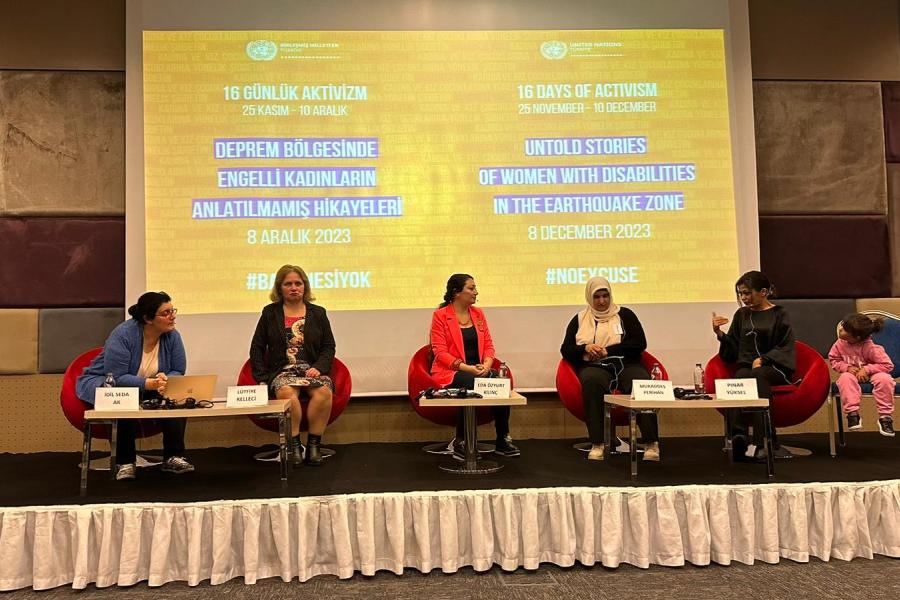
Opening the panel Eda Özyurt emphasized in times of conflicts, mass migrations, and disasters, gender-based violence tends to increase as the justice mechanism is damaged like all other mechanisms. “Therefore, after disasters such as earthquakes, as humanitarian aid workers, we do not look for an answer to the question of whether gender-based violence exists, we try to take preventive and protective measures with the assumption that it is on the rise. And one of the most affected groups is women and girls with disabilities” said Özyurt.
Panelist Kelleci stressed that the key to achieving gender equality hinges on challenging societal norms and roles assigned to different genders, requiring active participation of women in the labor force, dismantling barriers to their advancement, and increasing their roles in decision-making mechanisms.
Kelleci emphasized the importance of addressing the educational challenges faced by girls with disabilities, particularly the reluctance to send them to boarding schools due to societal norms. She highlighted the urgent need for accessible educational options, especially for the hearing impaired, and underscored the importance of inclusive training for search and rescue teams, including systems tailored for individuals with hearing impairments.
Panelist İdil Seda Ak said "In Türkiye, the stark gender disparities among people with disabilities reveal a 51.26 per cent illiteracy rate for women, exacerbating their vulnerability as only 12.5 per cent participate in the labor force. This disadvantage not only places them at higher risk of violence but also highlights the urgent need for targeted support and intervention.”
Ak underscored that women with disabilities, particularly those with mental health challenges, face heightened risks of sexual abuse. Existing rehabilitation centers lack inclusivity, with limited accessibility for those with hearing impairments.
Panelist Pınar Yücel, shared her personal experience, emphasizing the increased obstacles she faced after the earthquake. "I define myself as a special person, not a disabled person," she said, highlighting the difficulties in caring for her two children on her own after the earthquakes.
Panelist Mukaddes Perihan shared that her educational journey commenced at the age of 27, securing employment at 34. Reflecting on the earthquake experience, Perihan said instead of prioritizing essential items like a coat or flashlight, her instinct led her to grab her headscarf and long skirt first when the earthquake happened.
Perihan is from Kahta district of Adıyaman. She said there is no organization where she lives that brings women with similar stories together. “If there was, we would support each other, we would learn from each other. Fortunately, I have a supportive family, they make it easier for me to get things done, but life is more difficult for women without this support” she said.
